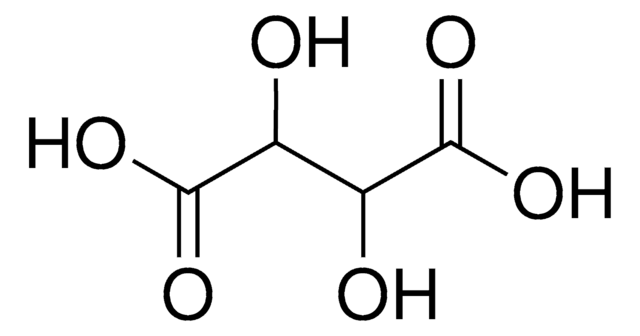W304401
DL-Tartaric acid
≥99%
Sinónimos:
DL-2,3-Dihydroxybutanedioic acid
About This Item
Productos recomendados
biological source
synthetic
Quality Level
assay
≥99%
mp
210-212 °C (lit.)
application(s)
flavors and fragrances
documentation
see Safety & Documentation for available documents
food allergen
no known allergens
organoleptic
odorless
SMILES string
O[C@@H]([C@H](O)C(O)=O)C(O)=O
InChI
1S/C4H6O6/c5-1(3(7)8)2(6)4(9)10/h1-2,5-6H,(H,7,8)(H,9,10)/t1-,2-/m0/s1
InChI key
FEWJPZIEWOKRBE-LWMBPPNESA-N
¿Está buscando productos similares? Visita Guía de comparación de productos
Disclaimer
signalword
Danger
hcodes
Hazard Classifications
Eye Dam. 1
Storage Class
11 - Combustible Solids
wgk_germany
WGK 3
flash_point_f
410.0 °F - closed cup
flash_point_c
210 °C - closed cup
ppe
dust mask type N95 (US), Eyeshields, Gloves
Elija entre una de las versiones más recientes:
¿Ya tiene este producto?
Encuentre la documentación para los productos que ha comprado recientemente en la Biblioteca de documentos.
Los clientes también vieron
Chromatograms
application for HPLCNuestro equipo de científicos tiene experiencia en todas las áreas de investigación: Ciencias de la vida, Ciencia de los materiales, Síntesis química, Cromatografía, Analítica y muchas otras.
Póngase en contacto con el Servicio técnico








